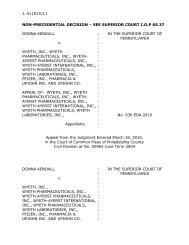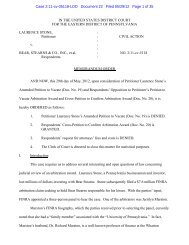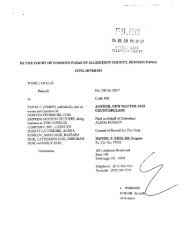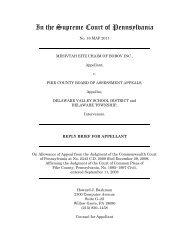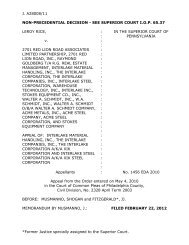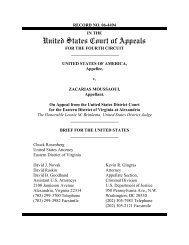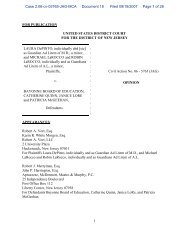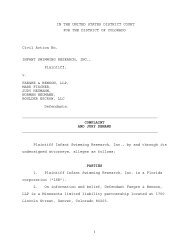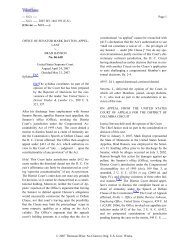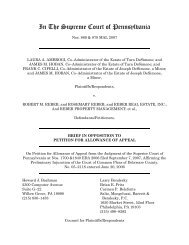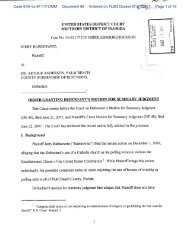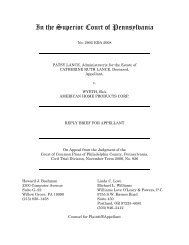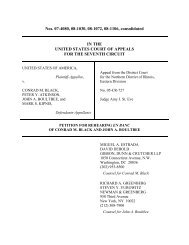In the Superior Court of Pennsylvania - How Appealing
In the Superior Court of Pennsylvania - How Appealing
In the Superior Court of Pennsylvania - How Appealing
Create successful ePaper yourself
Turn your PDF publications into a flip-book with our unique Google optimized e-Paper software.
to sue had expired, that her surgeon’s negligence may have been to blame for her<br />
injury simply by requesting that o<strong>the</strong>r doctor’s records. Moreover, <strong>the</strong> plaintiff,<br />
during her deposition, had testified that she had first concluded that her injury may<br />
have resulted from her surgeon’s negligence in September 2001, more than two<br />
years before she filed suit. Id. at 167, 964 A.2d at 357.<br />
Despite <strong>the</strong>se facts that were seemingly unfavorable to <strong>the</strong> plaintiff’s<br />
invocation <strong>of</strong> <strong>the</strong> discovery rule — including plaintiff’s own deposition testimony<br />
that she realized her doctor was negligent more than two years before filing suit —<br />
this <strong>Court</strong> in Wilson never<strong>the</strong>less held that plaintiff’s invocation <strong>of</strong> <strong>the</strong> discovery<br />
rule presented a jury question. Id. at 181 & n.12, 964 A.2d at 365–66 & n.12.<br />
Defendants’ out–<strong>of</strong>–context quote from Wilson for <strong>the</strong> proposition that <strong>Pennsylvania</strong><br />
applies <strong>the</strong> discovery rule more strictly than many o<strong>the</strong>r States in fact represents<br />
nothing more than this <strong>Court</strong>’s recognition that in many o<strong>the</strong>r States <strong>the</strong> statute <strong>of</strong><br />
limitations issue in Wilson would have been resolved as a matter <strong>of</strong> law in favor <strong>of</strong><br />
<strong>the</strong> plaintiff, whereas in <strong>Pennsylvania</strong> it presented a jury question capable <strong>of</strong> being<br />
resolved in favor <strong>of</strong> ei<strong>the</strong>r party. Id. at 181 n.12, 964 A.2d at 366 n.12.<br />
<strong>In</strong> Wilson, as in Fine, it was ascertainable as a matter <strong>of</strong> accepted scientific<br />
knowledge that <strong>the</strong> injuries that <strong>the</strong> plaintiffs sustained could have resulted from<br />
<strong>the</strong>ir surgeons’ negligence. <strong>In</strong> this appeal, by contrast, plaintiffs could not present<br />
sufficient scientific evidence that defendants’ combination hormone replacement<br />
<strong>the</strong>rapy caused <strong>the</strong>ir breast cancers until July 9, 2002, fewer than two years before<br />
<strong>the</strong>y filed suit. Thus here, unlike in Wilson and Fine, <strong>the</strong>re was no “channel” in<br />
– 28 –



